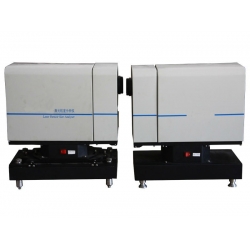
TR-SA318C is a split-style laser particle size analyzer dedicated to studying sprays. It can also study particles dispersed within air or liquids, or emulsions if itŌĆÖs used in combination with dry/wet dispersing systems.
Main Features:
Measurement principle: It carries out non-contact measurements on sprays and the calculation is based on Fraunhofer light diffraction theory. An unconstrained fitting program processes the data and can obtain accurate results for any sorts of size distributions.
Novel technique: The spectrum amplification technique extended the measurable range up to 2000um, without the need to increase the instrument dimension. Multiple detector arrays measure the scattered laser at a wide range of angles and this ensures reliable results for both big and small particles.
Split-style With such a design the spray range can be adjust from 1 to 10 meters. This meets the needs of many users, and the measurements have non-contact and non-disturbance to the sprays. Such an open design makes It to be able to study particles dispersed within air or liquids, or emulsions if itŌĆÖs used in combination with the dry/wet dispersing systems
Contamination proof The instrument is protected from contamination of the sprays.
Rich software functions: Beside the basic function of analyzing the size distributions, the software also has the following
features:
a) The output has rich content including: size distribution, R-R distribution, logarithmic distribution, statistics within different size ranges, volume distribution, number distribution, the percentage of particles of a certain size, or a certain size range, and comparison of multiple results.
b) The output could be in Word, Excel, Bmp pictures and Text formats, and this makes easy viewing and referencing the results at different situations.
c) It supports English and Chinese languages, and it can be changed to many other language versions according to the userŌĆÖs needs.
d) Calibration: Throughout the measurable size ranges the instrument is calibrated with ChinaŌĆÖs standard reference particulate materials. The resolution and accuracy are guaranteed.
Specifications ’╝Ü
Model | TR-SA318A | TR-SA318B | TR-SA318C |
Execution standard | ISO13320’╝īGB/T19077.1-2008’╝īQ/JW001-2006 |
Structure | Split-type |
Measurement range | 4.6-323╬╝m | 15-711╬╝m | 4.6-2000╬╝m |
Number of channel | 30 | 30 | 60 |
Accuracy error | <3%’╝łstandard reference materials’╝ē |
Reproducibility error | <3%’╝łstandard reference material’╝ē |
Laser | LD pump laser; ╬╗=532nm’╝øp>40mw |
Sample introduction | open |
Spray area range | 1-10m |
Lens protection | Double air curtains |
Adjusting range | Horizontal moving | ┬▒20mm |
Lifting | ┬▒20mm |
rotation | ┬▒20┬░ |
Dimension | 500mm├Ś254mm├Ś520mm├Ś2 |
Weight | 45Kg+23Kg |
Shipping Package ’╝Ü
Name | Quantity |
PSA318 | 1 |
Laser particle analyzer software ’╝łincluding Encryption dog’╝ē | 1 |
Low noise fan | 2 |
Manual | 1 |
Standard Reference material | 1 bottle |
Gears | 1 set |
Power line | 2 |
Signal cable | 2 |
USB conversion line | 2 |
Applications:
Studying sprays appearing in the study of fire fighting, pesticides, air engine, spray granulation, nozzles and aerosol sprays.
Specifications:
Model | TR-SA318A | TR-SA318B | TR-SA318C |
Execution standard | ISO13320’╝īGB/T19077.1-2008’╝īQ/JW001-2006 |
Structure | Split-type |
Measurement range | 4.6-323╬╝m | 15-711╬╝m | 4.6-2000╬╝m |
Number of channel | 30 | 30 | 60 |
Accuracy error | <3%’╝łstandard reference materials’╝ē |
Reproducibility error | <3%’╝łstandard reference material’╝ē |
Laser | LD pump laser; ╬╗=532nm’╝øp>40mw |
Sample introduction | open |
Spray area range | 1-10m |
Lens protection | Double air curtains |
Adjusting range | Horizontal moving | ┬▒20mm |
Lifting | ┬▒20mm |
rotation | ┬▒20┬░ |
Dimension | 500mm├Ś254mm├Ś520mm├Ś2 |
Weight | 45Kg+23Kg |
Shipping Package:
Name | Quantity |
PSA318 | 1 |
Laser particle analyzer software ’╝łincluding Encryption dog’╝ē | 1 |
Low noise fan | 2 |
Manual | 1 |
Standard Reference material | 1 bottle |
Gears | 1 set |
Power line | 2 |
Signal cable | 2 |
USB conversion line | 2 |
Applications:
Studying sprays appearing in the study of fire fighting, pesticides, air engine, spray granulation, nozzles and aerosol sprays.

